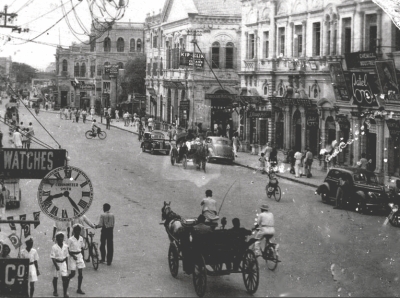| Home - Back Issues - The Team - Contact Us |
 |
| Volume 11 |Issue 33| August 17, 2012 | |
|
|
Musings Fun & Frolic in “The Sun” Fayza Haq
Working for a daily newspaper with colour magazines was an experience, even in the past. Cheek by jowl with the British Embassy and a bordello, the newspaper office also had a restaurant of sorts which served “anda-curry,” a hot favourite of women, travelling cheap, laughing, all the way. Pasting pages is an art. Yet we got up early to stick them, so we could have our way. Running parallel to one of the biggest boulevards, Dr Ziauddin Road, papers and journals were sold at the steps leading to the rooms where we girls worked in unison, joining hands with cartoonists and photographers. Each girl, in her early 20s, had a page to bring out every day, plus write items like “Highjacking we will go” when Laila Khalid hijacked a plane for the Arab world.
It was great fun for us to stop wearing the long green gown with the white ribbon, which told the world that you had once been a lecturer, and so they whispered, when you buzzed in to shop for a while, for one item or another, at the Bhori Bazaar, the favourite middle-class shopping centre, where everything was sold, from food snacks to colognes, like economic but exotic “Blue Train”. You did not feel claustrophobic although you were together for long hours. This was perhaps because you knew each other and had studied together. The journalism bout was an extension of the school, college, and university, where you had serious professors and foreign nuns as teachers to guide you on. You loved bringing out a page a day, although it meant standing for hours together. There was reporting, editing, subbing and writing to handle. Once in a while you were given an editorial to write. Writing for the magazines is what the “whiz kids” loved best. We were once the cream of the school, college and university. We were honoured to be asked the join what was the “Fleet Street” of Karachi, the new hope, The Sun. At the time, it covered the news of both the wings of the then Pakistan and had the best of reporters, including Aataus Samad, who had described the Sheikh as one who wore the crown of thorns, decades back.
It was not all work in the paper. If we gaggle of girls had saved enough, we had thick chicken corn soup for a change, in neat porcelain bowls at a nearby classy restaurant, complete with damask napkins, and crotons in the corner of the black, iron furniture. But we didn't dawdle over this. We had no mobile phones those days. Even the “telly” was a nouveau phenomenon. We tended to watch only sophisticated British items, just as earlier on, we listened patiently to Omar Qureishi's radio commentary in English. We had been Anglophile and Francophile for years. My younger sister and her friends, modelled for me. The younger sisters of my friend, Rehana Hakim, who now runs a very popular magazine, and her younger sisters, similarly, posed for me, and provided me with superb interviews. They were interviewed themselves when they came to Dhaka. In fact, all my Karachi girlfriends have seen more cities in Bangladesh than I've had the fortune to do, at least Chittagong, Rajshahi and Pabna were a must for them, in the past. Their relatives happened to study in schools, in Dhaka. At that time, there was not the bitter mistrust of today.
The American Centre, where we girls read out our poems, presented ideas out of nowhere, read lines from plays, and depicted interesting characters, was easy to reach. The German Centre, where we girls learnt the language, and attended lectures on Fauvism, was next door. The editor did not mind that we wanted to enlarge our horizons. Where education was concerned, he allowed just about anything. He did not, however, allow us to pursue formal art, at the nearby Arts Council. He said that in print, we couldn't bluff the reader. But with paintings, it was possible. Our talents on stage had not gone amiss. From Chaucer's Tales to Robert Herrick, and TS Eliot's “The Love Song of J. Alfred Prufrock”, and “The Four Quartets” to the knowledge of lines, “Let us go, then you and I, like a patient etherised on the table” and “Those were his eyes that were like pearls”, our explorations knew no bounds. Similarly, the knowledge of master writers helped with our writing skills. The smattering of German and French also aided our writing. We may not have known all there was to the “Romantic imagination”, or “The mirror and the lamp”, or even the Greek and Roman myths. But whatever we had mastered, all was grist that came to the mill.
|
||||||
Copyright
(R) thedailystar.net 2012 |



